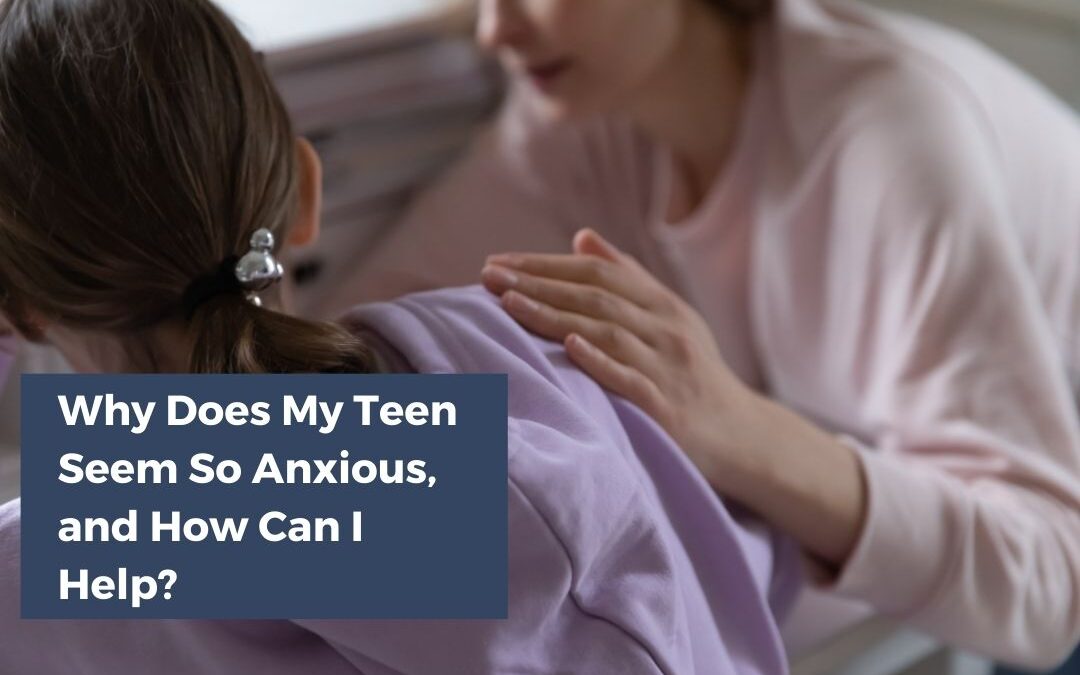Parenting teens can feel like navigating a minefield of emotions and challenges, and anxiety is often one of the most confusing parts of this stage of life. This post explores why teens seem so anxious, what might be contributing to those feelings, and how you can help. It’s not about solving every problem or eliminating anxiety altogether—it’s about understanding, supporting, and empowering your teen to handle life’s challenges.
What Is the Difference Between Anxiety and Stress?
A lot of parents feel unsure about where the line is between stress and anxiety. It’s an important distinction.
Stress is more about a specific project or event. You might feel stress when you have a lot of things going on. Often, when that task is ticked off, the stress can go. Anxiety, on the other hand, can be constant—worrying about whether you’ve done something right or fearing the worst in situations.
This is why your teen might still feel anxious even after completing a stressful task like an exam. Anxiety isn’t just situational; it’s often tied to unhelpful thinking patterns that cause rumination and excessive worry.
Why Are Teens More Prone to Anxiety?
Adolescence is a critical time for brain development. Emotional regulation is still maturing, which means teens don’t always have the tools to manage their emotions effectively. Combine this with external pressures like school, social relationships, and future uncertainty, and it’s no wonder anxiety levels can skyrocket.
Developmentally, teens are going through a number of changes, and there’s a critical phase of brain development where emotional regulation is still maturing. They haven’t quite learned how to navigate that yet, and that gives us as parents or caregivers an opportunity to help.
What Are the Common Triggers for Anxiety in Teens?
Teens face a unique mix of stressors that can contribute to anxiety, including:
- Academic pressures: Fear of failing exams, meeting expectations, or deciding on future career paths can weigh heavily on their minds.
- Social pressures: Navigating friendships and relationships can be tricky, especially when amplified by social media.
- Global issues: Climate change, political unrest, and economic uncertainty can leave teens feeling overwhelmed about their future.
- Family dynamics: High parental expectations, family conflict, or significant changes like moving house can also contribute.
It’s important to remember that these triggers are highly personal. What seems minor to an adult might feel overwhelming to a teen.
How Can I Support My Teen Through Anxiety?
The key to helping your teen manage anxiety isn’t about fixing their problems but supporting them as they learn to navigate challenges themselves. Here are some strategies:
- Listen with empathy: If your teen is saying things like, You just don’t listen to me, then maybe that’s an area for improvement. Listening with empathy doesn’t mean agreeing or fixing; it means showing that you understand how hard it feels for them in that moment.
- Validate their feelings: Avoid dismissive phrases like, You’re overreacting, or There’s nothing to worry about. Instead, try saying, I can see why you’re feeling anxious about that.
- Help them label their emotions: Dan Siegel’s concept of name it to tame it is really helpful. Encourage your teen to name their feelings—it might help them move from saying I am anxious to I’m feeling anxious. That small shift can create a sense of control.
- Encourage problem-solving and resilience: It’s tempting to jump in and fix things, but teens need opportunities to tackle problems on their own. The concept of allowing for the dignity of risk can help. For example, if your teen gets on the wrong train, instead of immediately rescuing them, let them take a moment to figure out how to get back on track (unless it’s a safety issue).
- Model healthy coping strategies: Show your teen that self-care and relaxation aren’t just buzzwords. If you’re feeling overwhelmed, you might say, I’m going to read a book or take a walk to clear my head. Let them see you using strategies that work.
When Should You Seek Professional Help?
Sometimes anxiety requires more support than you can provide at home. If your teen’s anxiety is interfering with daily life—such as avoiding school, withdrawing from friends, or experiencing panic attacks—it’s worth considering professional help.
It’s important to normalise therapy as a healthy way to cope. You might say, I’ve seen a therapist before, and it helped me a lot. Sharing your experiences can make the idea of seeking help less daunting.
Resources:
- Connected Teens Course: Learn how to strengthen your connection with your teen while respecting their individuality.
- Book Recommendation: Hold On to Your Kids by Gordon Neufeld and Gabor Maté – A helpful guide on supporting your teen’s emotional development.
Related Episode: Why Does My Teen Feel Overwhelmed and What Can I Do to Support Them– Discover how to identify and address overwhelm in teens.








Recent Comments